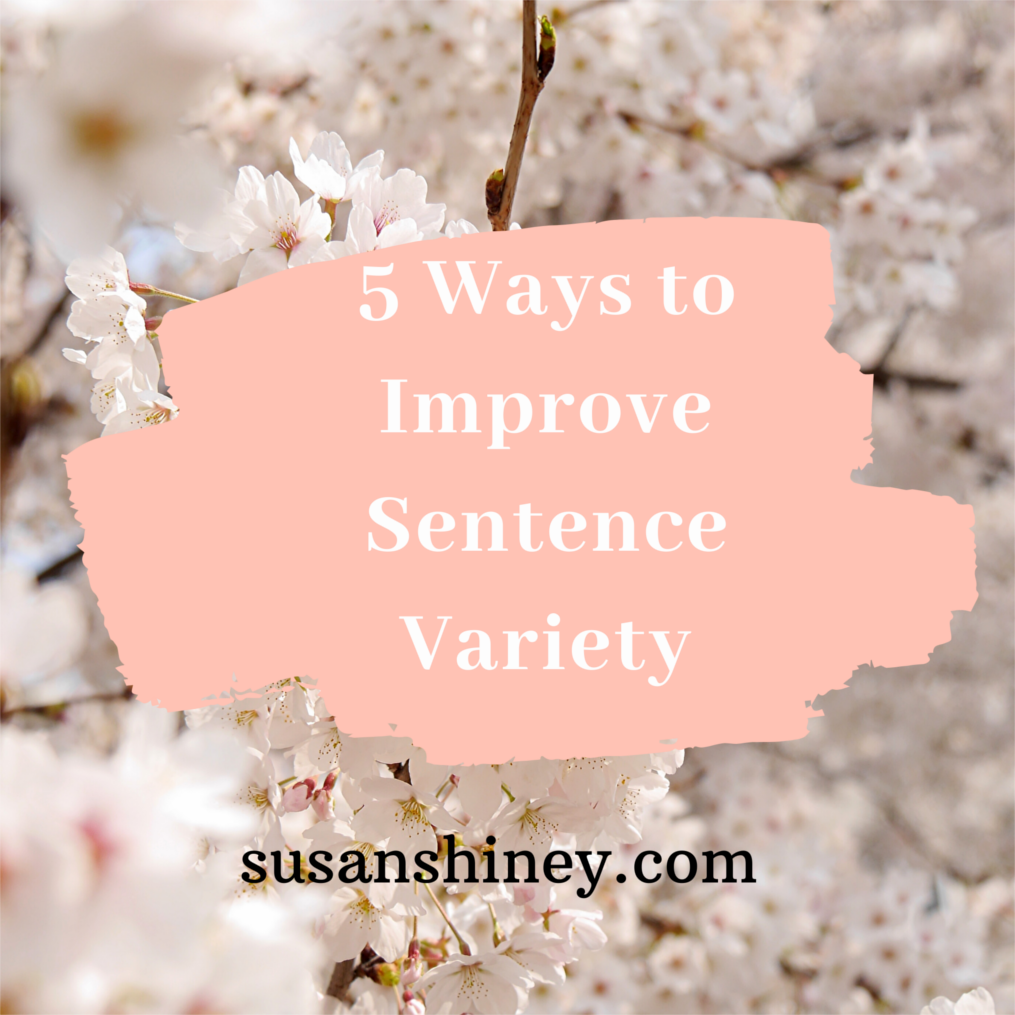
As I line edit my novel, I am writing blog posts to focus on aspects of writing I need to work on. For example, this filter word article : https://susanshiney.com/fumbling-around-with-filter-words/ .
In my last feedback session with critique partners, they mentioned my repetitive sentence structures. So true. My go to is complex sentences that start with a pronoun, in first person pov it tends to be I went...I walked...for every sentence, for 85,000 words, and that is a problem.
More specifically, this is about how to have better sentence variety within paragraphs.
It has been a huge awakening for me, because I always felt my prose was a bit elementary and I couldn't figure out why exactly. Now, I know, my complete lack of sentence variety!
I don't think about this at all until after I have done developmental editing and feel solid about all of the ideas I have on the page, then I dig into details like sentences and word choice, etc. I discuss my draft process more deeply in the filter word article as well.
So, how can you increase variety in your sentences:
1. Don't be repetitive in how you start sentences, unless you are doing it with skill. Let's start right off with the exception to the rule. An excellent example of repetition in sentence patterns is in Julie Otsuka's Buddha in the Attic.
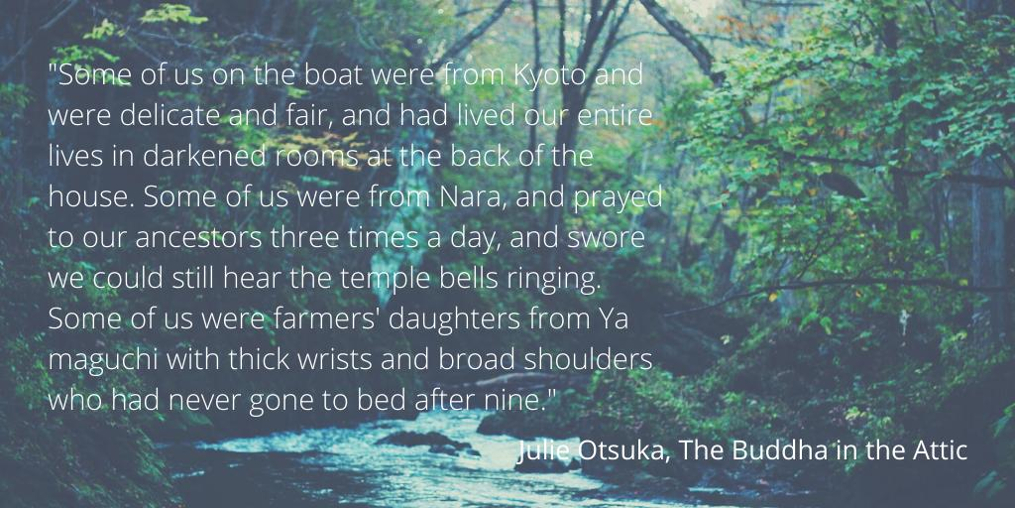
Some of us were... in three sentences in a row in the same paragraph, but done on purpose. Her poetic paragraphs are very powerful. The majority of her short novel uses this pattern and it is a marvel.
Therefore, if you want to tackle this device, try to make the beginnings of your sentences exactly the same to create a sense of momentum.
2. Switch up the way you are starting sentences by varying the parts of speech that they begin with.
Unless you are doing something poetic like in the previous tip, you need to pay attention to your go to patterns for starting sentences. As I said before, I tend to use pronouns (I, he, she) beginnings. Here are some other ways you can start sentences:
The simple:
Noun- Susan needs to learn new ways to start her sentences.
Article- The novel you are working on will keep getting better with revisions.
Gerund- Writing can be exhilarating sometimes, and infuriating at others.
Infinitive- To skip over line editing is a recipe for disaster.
Adverb- Patiently, she read her first draft without judgement.
Adjective- Blank pages need to be filled.
A bit more complicated:
Participle- Singing in the shower like always, Nick couldn't hear the knock on the front door.
-Shocked by the fireworks, the dog hid under the bed all night.
(A participle is formed from a verb, it can be used as an adjective or as a compound verb form. The present participle ends in -ing and the past participle -ed, -en, -d, -t, -n)
Prepositional Phrase- Behind the scenes there was a lot going on.
(A prepositional phrase is a groups of words containing prepositions)
Noun clause- Whoever did this, is responsible.
(A noun clause is a dependent clause that acts like a noun. Typical words noun clause starts with are that, what, whichever, whoever, whether.)
Adverb clause- While playing baseball, he realized he was allergic to grass.
(An adverb clause is a group of words that function as an adverb in a sentence. They answer the questions: When? Where? Why? How?)
In earlier drafts it is very easy to have the same subject and verb repeated without being aware of it, so when I line-edit, I start with the beginnings of my sentences. I chronicle these revisions for the flash fiction stories I write for my blog.
In my flash fiction story here: https://susanshiney.com/an-origin-myth-of-magical-mist-or-whatever/
I revised the beginning of these sentences in this example:
Original:
I was having none of it. I stood up tall and moved by shoulders back, "Now you listen to me dragon.(Pronoun) I have in my possession a poisonous spray. I'll blind you. Believe me." I sprayed off a warning shot to the side, and narrowed my eyes and pushed out my lips. Then took a giant leap forward in his direction. I remember the time a mouse charged me in my apartment and I totally lost my shit.
Revised:
(Pronoun) I was having none of it. (Noun clause) The fact that it was a dragon really pissed me off because the Discovery Channel never told me how to deal with one of these. (Participle) Standing tall and moving my shoulders back, I said, "Now you listen to me dragon. (Pronoun) I have in my possession a poisonous spray. I'll blind you. Believe me."(Pronoun) I sprayed off a warning shot to the side, and narrowed my eyes and plumped out my lips. (Adjective) Duck lips can be empowering in the right context, man.(Participle) Leaping forward in his direction, I wanted to scare him away. (Pronoun) I remembered the time a mouse charged me in my apartment and I totally lost my shit.
The changes make the descriptions more dynamic.
3. Vary the types of sentences.
Let's review all of the different kinds of sentences in your toolbox:
There are four types of sentence structures:
Simple sentences: I like writing.
(A simple sentence is an independent clause without conjunctions or dependent clauses.)
Compound sentences: I like writing and Jeanie likes surfing.
(A compound sentence is two independent clauses joined by a conjunction or semi-colon.)
Complex sentences: I like writing because it is fulfilling.
(A complex sentence has an independent clause and a dependent clause.)
Compound-complex sentences: I like writing because it is fulfilling but Jeanie thinks creative pursuits are boring.
(A compound-complex sentence has two or more independent clauses and one or more dependent clauses.)
There are four types of sentence forms:
Declarative sentences: Orcas are beautiful animals.
(Most common sentence type that is used to state something.)
Interrogative sentences: Did you hear me?
(Questions.)
Imperative sentences: Close the door.
(Commands or requests.)
Exclamatory sentences: I already told you four times!
(Express emotions end with an exclamation mark.)
Adding these to your checklist when looking at sentence patterns in helpful.
4. Use transition words.
I never use these and I am not sure why...I want to note how writers use them more when I am reading. I associate transition words with writing academic essays and unconsciously never apply them to my fiction.
There are words that add to an idea (additionally), show cause (since), show contrast (although), and add emphasis (especially).
I am going to print out a huge list and keep it in my writing notebook for reference when I am editing and revising sentences.
5. Mix up the lengths of sentences.
Ursula K. LeGuin in her book Steering the Craft discusses the length of sentences beautifully, pg. 23, "Very short sentences, isolated or in a series, are highly effective in the right places. Prose consisting of short, syntactically simple sentences is monotonous, choppy, irritating. If short-sentence prose goes on very long, whatever its content, the thump-thump beat gives it a false simplicity that soon just sounds stupid. See spot. See Jane. See Spot bite Jane."
I love how short sentences add to the rhythm of the paragraphs I am reading. It is good to think about what effect you can add by sprinkling some in when you revise.
LeGuin also discusses long sentences on pg. 24, "Narrative prose consisting largely of long, complex sentences, full of embedded clauses and all the rest of the syntactical armature, takes some care. Long sentences have to be carefully and knowledgeably managed, solidly constructed; their connections must be clear, so that they flow, carrying the reader along easily."
Taking note of especially long sentences while reading is helpful to dissect their constructions. I also like googling long sentence examples to see how they work out of context.
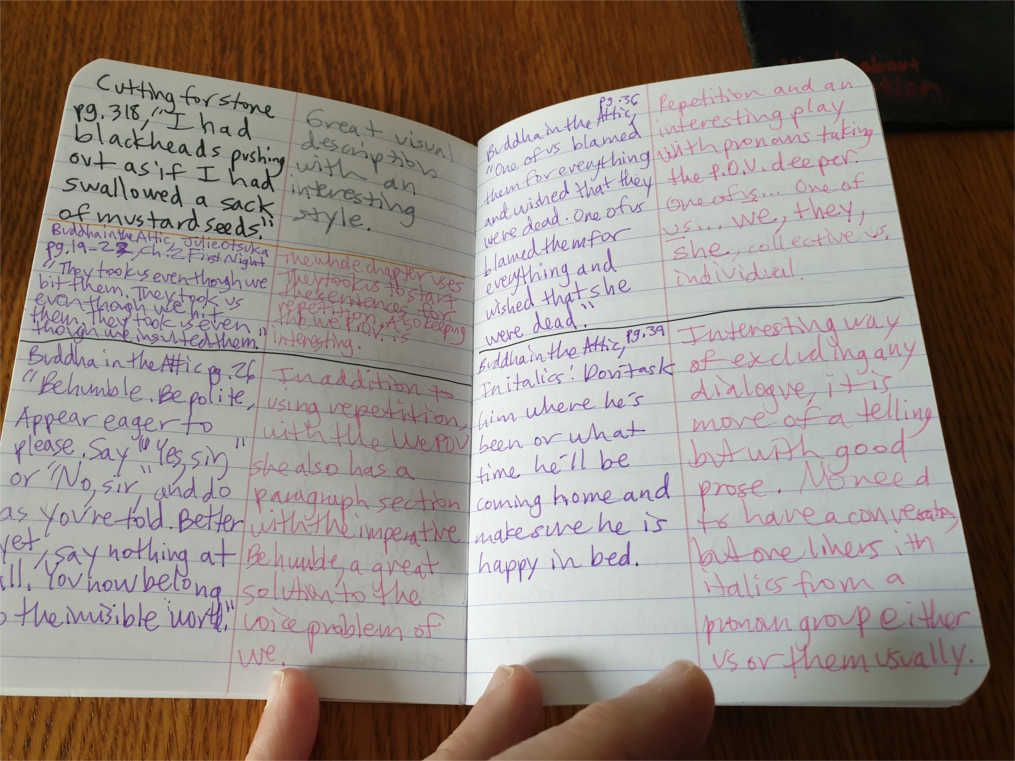
To really take in all kinds of sentences and the effect they have I need to read more and keep track of good prose. Double-entry journals where I write the quote on one side and my reaction on the other is a good way for me to log the sentence structures I am focusing on.
I will use this checklist as I go through my prose:
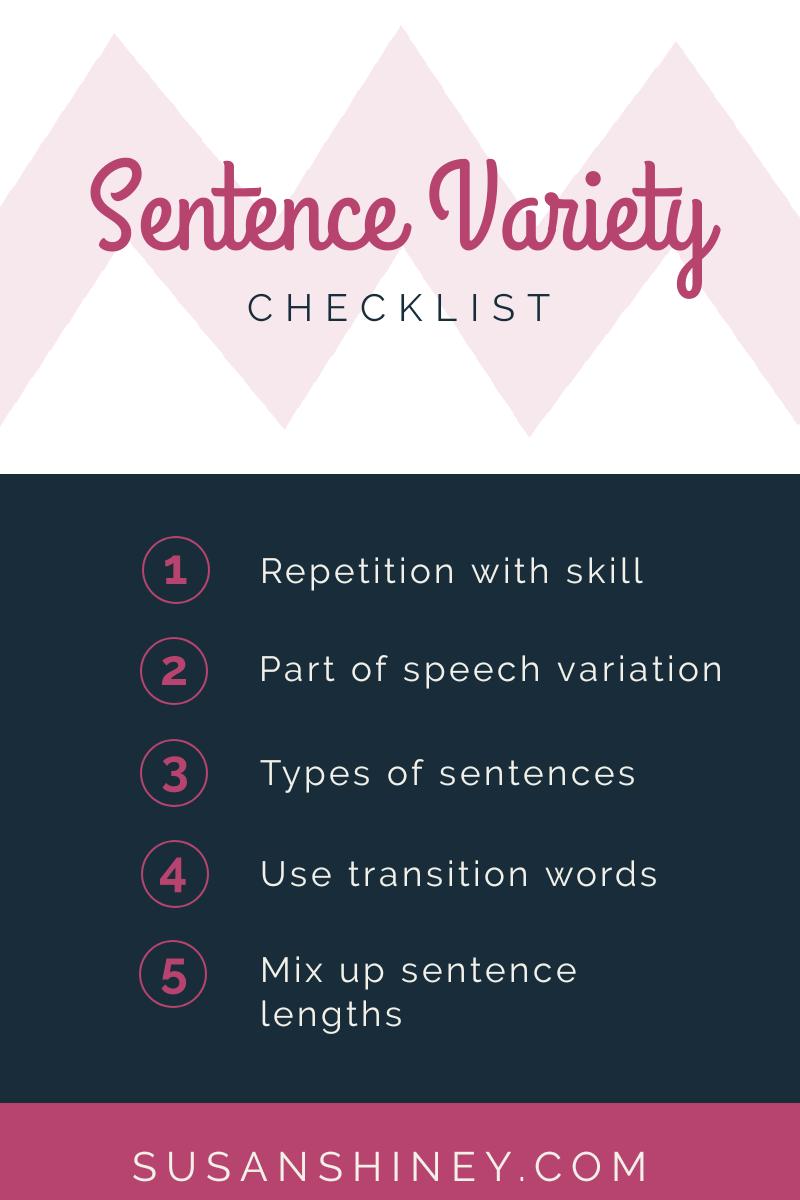
If you want to check out some resources I gathered on sentence variety, you can take a look at my pinterest board here: https://www.pinterest.com/susanshiney/types-of-sentences/
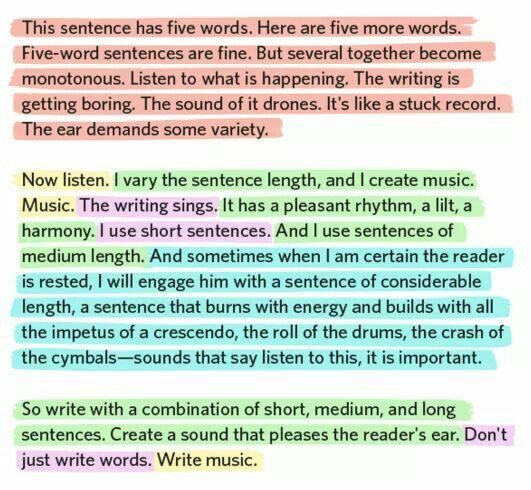
Above, is a quote from Gary Provost. It takes time to find your music, but that is part of the fun, isn't it?
I will conclude with Ursula K. LeGuin discussing the importance of changing things up on pg. 24, "There is no optimum sentence length. The optimum is variety. The length of a sentence in good prose is established by contrast and interplay with the sentences around it - and by what it says and does."
How do you work on sentence variety in your writing? Is it something that comes naturally or do you have to work at it?